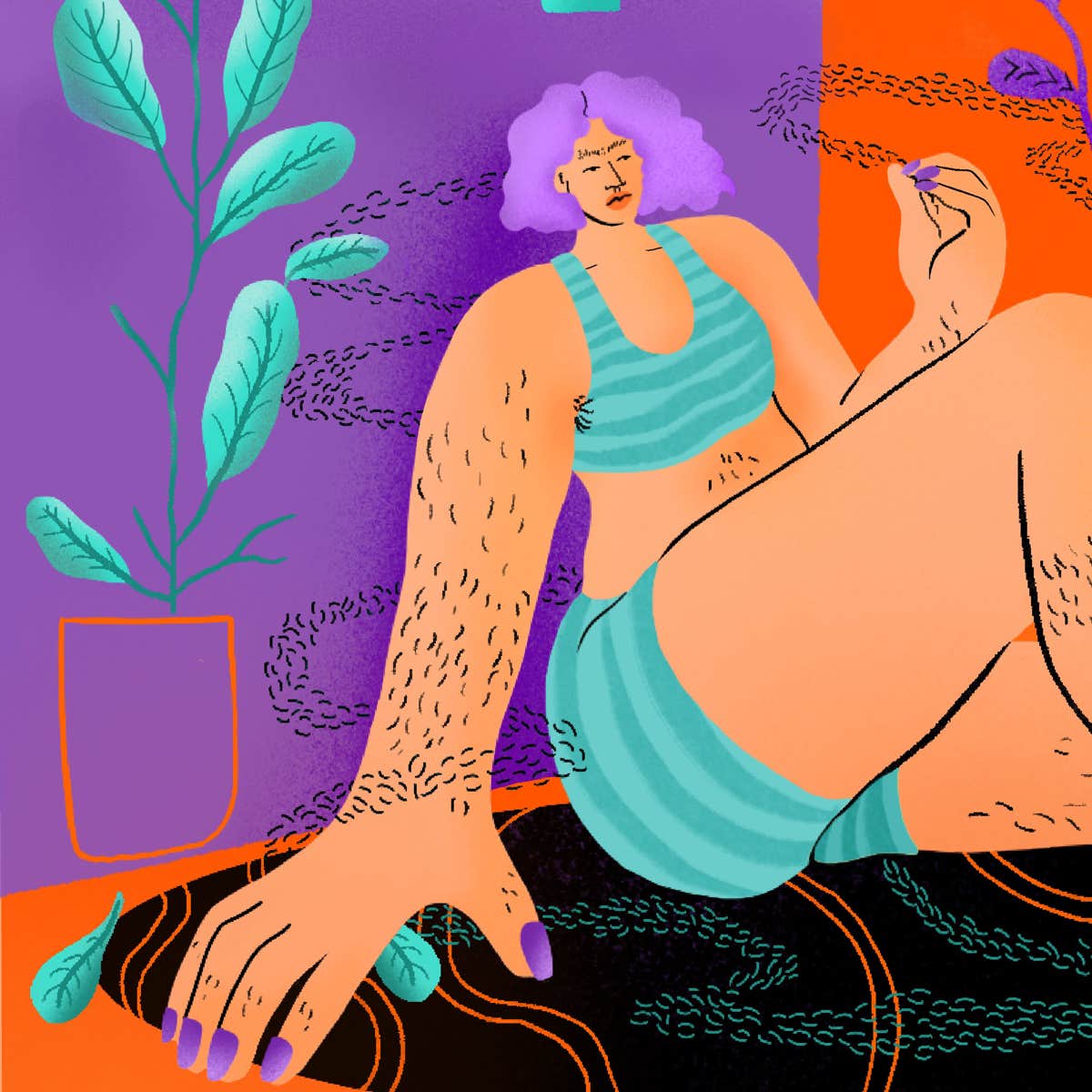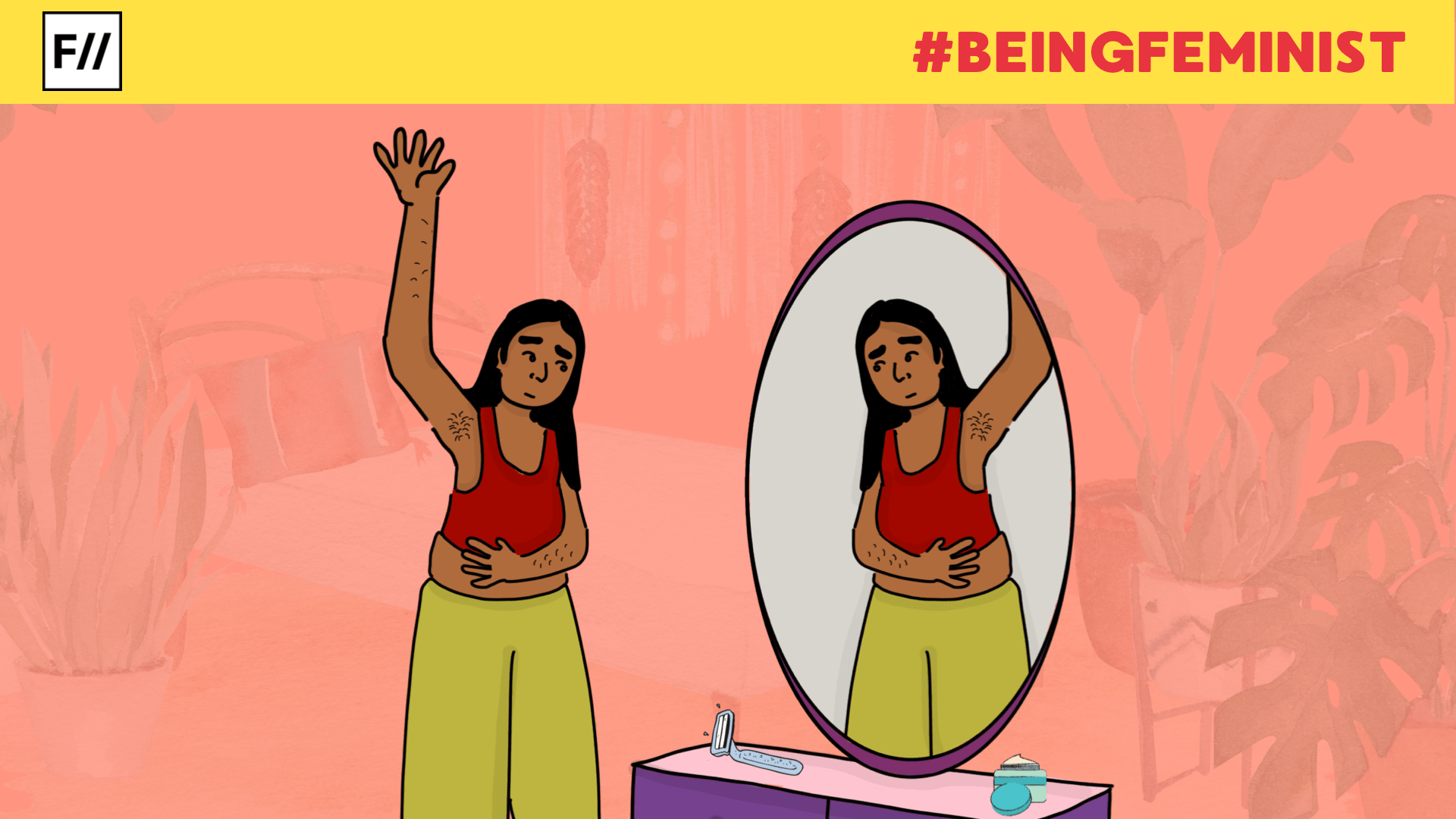Editorial Note: Being Feminist is a fortnightly column that features personal narratives documenting the emotions, vulnerabilities and innermost contradictions every feminist encounters while trying to push through various degrees of patriarchy in private, professional and public spaces.
Quite recently, I shared an Instagram reel by a content creator on what it means to be feminine. She pointed out her acne and strong jawline, but what stood out to me was the fact that she unabashedly showed her body hair in the reel.
I would like to believe that I have been consciously labelling myself as a feminist for at least four years now. I went through my journey of learning body positivity evolved into the understanding that everybody is their own kind of beautiful. Despite, after seeing the reel, I felt compelled to share it because I found the idea of embracing body hair ‘extraordinary‘.
Why does body hair matter so much to us when it is universally known that its growth is not an anomaly? The archaic notion of body hair as a gender identifier does not stand the test of time, and my brain agrees, not to mention that the concept reinforces gender binaries which are exclusionary of many individuals.
But years of internalisation of distorted body standards will take a little longer to unlearn. No matter how much I claim to be comfortable within my skin, my instinctive urge to put my hand down if I am wearing a sleeveless top or my constant itch to pull my crop top down, disagrees with me.

One look at the advertisements for hair removal products shows how apart from obviously portraying hairless women as desirable, our visual culture tries to fortify the narrative that it is more comfortable for women to get rid of body hair. Phrases like ‘velvety smooth skin’ juxtaposed with images of young girls laughing and rejoicing in their freedom, and addressing ‘other bodies’ with adjectives like ‘prickly‘, add to this narrative. I had bought into this marketing technique too, feeling restless whenever I would see my hair growing back. One of the very few good things that came out of the lockdown for me was the restricted access to salons, which made me realise that going about my routine with my ‘hairy body’ is actually quite comfortable
Many of these notions are set in our conscience as a precedent by our parents and society, early on in our childhood. The mother who reprimanded me for raising my hands because I had dark underarms, the sibling who asked me not to wear skirts because of my hairy legs, the friend who said he doubted if I was a boy because of the hair on my chin – the list goes on.
These random comments that were masked as ‘light hearted suggestions‘ (the nickname ‘bear‘ was a particular hit) were slowly but surely building the idea in me that I was not desirable because I had more body hair. Add PCOS ( Polycystic ovary syndrome) and hirsutism (excessive growth of dark and coarse hair) to the situation, and you have a recipe for self-esteem disaster.
My journey to get rid of body hair started with Veet, the hair removal cream, in the sixth grade. It took me exactly about two days to figure out that hair removal cream and underarm lightening roll ons were absolutely not a good combination for my skin. But so persistent was the insecurity rooted in me that it took my skin to peel off for me to stop using them.
That did not mean I had learnt my lesson. I experimented with other hair removal creams, waxing and shaving. I was not aware that it had become an obsession, untill I used all my allowances to buy myself an epilator set that was worth five thousand rupees. I remember the feeling of frustration and regret that followed when I realised that it did not do anything more than a razor did.

For a little while, I tried to take comfort in the fact that my excessive body hair growth was due to PCOS and it was okay because I had a medical condition. However, I quickly realised that coming to terms with body hair due to medical conditions like PCOS and adrenal virilism (development of male secondary sexual characteristics in females) was succumbing to biological essentialism – the idea that a person’s personality as well as characteristics like femininity or masculinity originate out of their innate essence, and a medical condition is the only exception that can reasonably exist.
Thankfully, due to the feminist discourses I had been part of by then, I realised how problematic going down that road would be. I was indirectly embracing a line of thought that gives worth to body hair on male bodies and equates it with masculinity, virility and sex appeal, while shunning female bodies for carrying them.
Also read: Femininity And Fashion: The Conflict Of Dressing To Fit In, While Being Feminist
Over the course of time, I have come to appreciate my natural body hair a little more, but that does not mean I am completely free of my internalised patriarchal conditionings. I feel like a hypocrite every time I cringe at my hairy arms. This journey of unlearning, at least for me, is one that ebbs and flows. On some days I feel divine in my unshaved limbs and on some others, I stare longingly at my razor. The compromise I have been able to make so far is that I will not be spending money for hair removal at salons. Nor am I willing to pay pink tax for razors ‘specially designed for the woman in me’
One look at the advertisements for hair removal products shows how apart from obviously portraying hairless women as desirable, our visual culture tries to fortify the narrative that it is more comfortable for women to get rid of body hair. Phrases like ‘velvety smooth skin’ juxtaposed with images of young girls laughing and rejoicing in their freedom, and addressing ‘other bodies’ with adjectives like ‘prickly‘, add to this narrative.
I had bought into this marketing technique too, feeling restless whenever I would see my hair growing back. One of the very few good things that came out of the lockdown for me was the restricted access to salons, which made me realise that going about my routine with my ‘hairy body’ is actually quite comfortable.

But what was not so comfortable was the awkward sex talk that I had with one of my friends about the hair ‘down there’ once we became sexually active. Looking back at that episode, I am appalled by my decision to place the approval of a random person who might see me naked, over my fear of sharp razors near my genitals.
Over the course of time, I have come to appreciate my natural body hair a little more, but that does not mean I am completely free of my internalised patriarchal conditionings. I feel like a hypocrite every time I cringe at my hairy arms. This journey of unlearning, at least for me, is one that ebbs and flows.
On some days I feel divine in my unshaved limbs and on some others, I stare longingly at my razor. The compromise I have been able to make so far is that I will not be spending money for hair removal at salons. Nor am I willing to pay pink tax for razors ‘specially designed for the woman in me’. I have vowed to myself to stick to normal razors, and use them sparsely.
Nonetheless, there is a tiny, traitorous voice that whispers to me, “So what if you do want to shave? It is your body, your right.” I will not shame any person over their choice to not retain their body hair because every body must be able to assert its own autonomy. But I am also acutely reflective of this question: If my idea of beauty and by extension body autonomy, is influenced by standards that were never inclusive and designed to make profit out of women’s insecurities, is it really autonomy?
Also read: ‘Is Fangirling Unfeminist?’: Loving A Bollywood Star And Enjoying Cricket While Being Feminist
Featured Illustration: Ritika Banerjee for Feminism In India
About the author(s)
Stephy is a masters student in Jamia. Her interests revolve around issues of conflict and peace, gender and mental health. She hopes to shed her inherent biases daily and become a better ally each day




